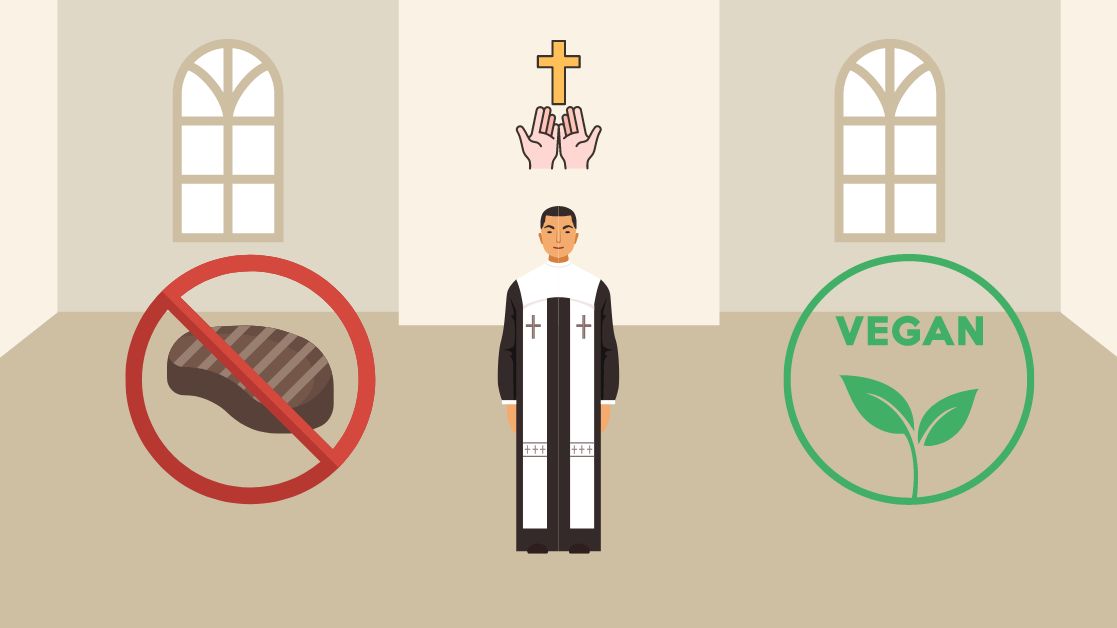In a nutshell, God’s love for you is not diminished by your choice of a plant-based diet, just as it is not diminished for those who consume meat. Christianity does not prohibit individuals from adopting a vegan or vegetarian lifestyle according to Bible.
While veganism has grown in popularity over the years, there are many different points of view about this movement in the Christian community. Hence, some people may ask if being vegan is a sin in the Bible.
This post will discuss what the Bible says about veganism. But first, let us briefly define what veganism is.
What is Veganism?
Veganism is the practice of not using animal products, particularly in diet, with associated principles that oppose the commodity status of animals.
The vegan diet, also known as a plant-based diet, is high in many essential nutrients, such as vitamins, fiber, and phytonutrients. It is also lower in calories and fat. Thus, the vegan diet has been linked to various health benefits, including a lower risk of cardiovascular disease.
However, for many individuals, veganism is more than just a way of life. Reducing meat consumption or transitioning to a plant-based diet can be due to environmental and humanitarian reasons.
Animal rights are frequently cited as a reason for avoiding animal products. People sometimes prefer vegetarianism or veganism due to how animals are grown and treated.
It is worth noting that God gave us dominion over the entire earth (Genesis 1:28), and he wants us to be accountable for how we treat His creation as part of that responsibility. Cruelty to animals is against a Christian worldview (Proverbs 12:10).
What Does the Scripture Say About Veganism?
The Bible contains numerous references to otherworldly foods, such as Elijah’s angelic food (1 Kings 19) and the heavenly manna during the Exodus.
Furthermore, the Bible gives food profound symbolic meaning, such as when Christ refers to Himself as the “bread of life” or His disciples as the “salt of the earth.”
Some Christians believe that veganism was part of God’s original intent for both man and animals in Genesis 1:29-30. As a result, they’ve decided that veganism is essential to living a redeemed and sanctified life.
However, the purely vegetarian program highlighted in Genesis was lifted immediately after the Flood in Genesis 9:3, when God told Noah that every living thing should be food for you.
Later, the Levitical law differentiated between clean (kosher) and unclean foods. It allowed Israelites to eat meat from animals that “part the hoof, are cloven-footed, and chew the cud,” but not the meat from all other animals (Leviticus 11).
However, in the New Testament, Jesus abolished these rules by “declaring all foods clean” (Mark 7:18-19). In Acts 10:9-16, God gave Peter a similar message. The apostle had a vision while on the roof of Simon’s house in Joppa. He was shown a sheet with various clean and unclean animals and was instructed, “What God has made clean, do not call common.”
The Bible mentions Jesus eating fish and lamb (Luke 24:42-43, Luke 22:8-15). In Matthew 14:17-21, Jesus miraculously fed the crowds fish and bread, which is unusual for a vegetarian.
In contrast to 1 Timothy 4:1-3, which forbids “abstinence from meals that God made to be received with gratitude,” Daniel 1:15 highlights the advantages of avoiding meat consumption.
Is it a Sin To Be a Vegan?
There is nothing wrong with being a vegan or vegetarian as a Christian. God originally created plants as a source of food.
The Bible does not mandate the consumption of meat. Hence, there is also nothing wrong with avoiding meat consumption.
The Bible says that we should not impose our beliefs on others or judge them based on what they eat or do not eat (Romans 14:2-3).
Bottom Line
Your preference for a plant-based diet does not lessen God’s love for you. The same thing applies to people who eat meat.
The New Testament repeatedly tells us that as believers, we must be tolerant of one another on such issues because they are secondary to the main point of saving faith in Jesus Christ. The apostle Paul once said in Romans 14:5, “Each should be fully convinced in his own mind.”
Lastly, any outright condemnation of plant-based living in the Bible appears to be accompanied by a call for non-judgment or a situation that explicitly condemns certain motives rather than veganism itself.
As a result, it appears unlikely that someone vegan out of love for animals or health reasons would be regarded sinful in God’s eyes.
Regardless of our personal views on the morality of veganism, we must remember not to judge others. It is best to keep having these difficult conversations to gain knowledge, understanding, and empathy as Christians and human beings.




